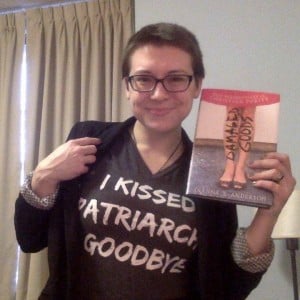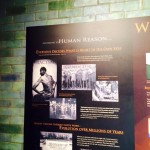Full disclosure: Dianna Anderson is a close friend of mine, and has been since before she started writing Damaged Goods. She did not ask me to write this review, but I fully believe her book is an important one. I will try to be as honest as I can in this review, but of course I have some friendship bias. 🙂

——-
Let me start by saying that I think Damaged Goods has something for everyone: for the atheist feminist wanting to know more about purity culture, for the “Jesus Feminist” trying to figure out their recently-embraced sexuality, even for evangelicals trying to figure out whether or not it’s “okay” to have sex.
However, not every part of this book will appeal to all of these groups and that’s okay.
Even as a friend of Dianna’s, and a published researcher on purity culture, not all of it appealed to me.
I caught myself skimming through chapter three, entitled “Let’s Get Biblical: Sex in Scripture.” As someone who gave up Biblical literalism/Biblical authority (whatever that means) years ago, I discovered I didn’t much care for what the Apostle Paul actually meant when he talked about premarital sex and what not.
However, I believe these chapters could be a great starting point for someone wondering whether or not they can turn away from purity culture and still be a “Bible-believing” Christian. If that’s you, great! I hope you are able to find answers there.
If that’s not you?
Please keep reading!
The second half of Anderson’s book is where I believe she really starts to shine.
My favorite thing about this book is Dianna’s story-telling style. She weaves her personal experience with thorough research in a way that I don’t see often in Christian books. I personally like that she doesn’t resort to the overly sentimental, Thomas-Kinkadean style that so many other Christian authors seem to love. Her to-the-point, matter-of-fact writing was a breath of fresh air for this Thinker.
Anderson isn’t afraid to talk about getting naked, having premarital sex, buying condoms, and being totally fine with those life choices.
My other favorite thing about Dianna’s book is her commitment to intersectionality. She is honest about her own perspective: she is writing as a white, cisgender, bisexual/queer Christian woman. She also careful to include other perspectives, using interviews and research others (who write from different perspectives) have done.
Though I have some criticisms with some of the language Anderson uses (some of which she has already addressed herself, which shows me that she is open to critique), appreciate the open-minded way that she approached this topic.
If you liked Jessica Valenti’s The Purity Myth, you will probably appreciate this book. I found it much more nuanced in it’s analysis of how purity culture affects people who are not straight, white, and cisgender.
If you are not a Christian, you should know that Anderson’s book is with a Christian publishing company, and Dianna herself is a Christian. She writes as a Christian and includes references to God throughout her work. Yet her deconstruction of purity culture is incredibly important for those who wish to understand this culture, even if they are looking at it from the outside. She has an insider’s perspective that many other feminist writers do not seem to have.
If you are a Christian, on the other hand, you may appreciate her perspective that refuses to equate a rejection of purity culture with a rejection of Christian faith. She explains a theology that liberates people from the “purity myth,” and allows people to embrace their full selves as made in the image of God.
Another thing that I really appreciated about Damaged Goods was how affirming it was of others’ personal journeys.
Many Christian feminists writers (such as Jamie Wright or Rachel Held Evans) will call out purity culture, but are quick to include a “but…”
“…but if you have premarital sex YOUR PENIS MIGHT FALL OFF!”
“…but this doesn’t mean Christians should go out and have one-night stands!”
“…but God made sex for marriage only!”
Anderson doesn’t do this. While she encourages readers to wait to have sex until they are mature enough to take precautions against sexually transmitted infections and potential pregnancies, and to respect the boundaries of others, her sexual ethic is based on consent and safety, not on marriage. She affirms premarital sex, even in cases of one-night stands and polyamorous relationships.
She even (gasp!) affirms the right for people to choose to have abortions, which is something you won’t see from many other “Jesus Feminists.”
I nearly cheered a few times at this, since most Christian feminists are quick to remind everyone that they are “pro-life,” even though pro-life positions do so harm to pregnant people.
Maybe you’re reading this review and feeling uncomfortable, though. Maybe you wouldn’t personally choose to have premarital sex, and you don’t think you’d ever choose to have an abortion yourself.
Don’t worry!
Damaged Goods is a book that recognizes everyone’s experience is different, and everyone will make different choices based on that experience. Anderson firmly affirms the right to choice to say “No” as much as she affirms the right to say “Yes.”
Since Anderson’s ethic is based in consent, she does not shame those who make different choices. She constantly reminds readers that their choices and journeys are valid:
…No one can make these decisions for you–you are the only one who can decide what to do with your body and your mind. I have gone through this journey too, and am writing to tell you that it’s OK to question…Developing your views on sex is a journey only you can take.
Whatever your journey, Damaged Goods has something for you. I have published academic research on purity culture, and even I learned a thing or too. You can pick up Damaged Goods at your local bookstore, or order it online.
















